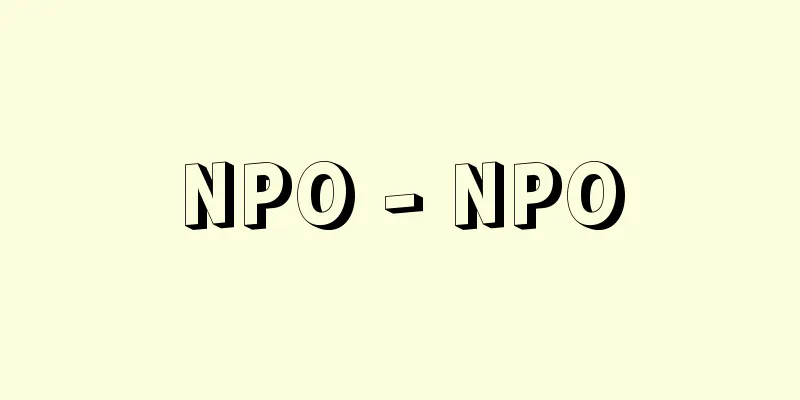NPO - NPO

|
Abbreviation for Non Profit Organization, meaning a private non-profit organization. It is a general term for private organizations that engage in public-interest civic activities without the purpose of profit, i.e., not for profit. In the United States, the requirements for an organization to be a non-profit are "formality," that is, the organization has a decision-making body and operates based on certain rules, "non-governmentality," that is, an entity independent from the government, and "non-profitness," that is, all profits are reinvested in the organization's activities. However, the legal requirements and tax treatment for obtaining corporate status vary from country to country, and there are many countries where there are no clear requirements. The areas of activity of NPOs are expanding and becoming more active in many areas, such as medical care and welfare, international cooperation and exchange, the environment, culture and art, sports, education, urban development, human rights and peace, and disaster relief. NPO activities are also playing a major role from an economic perspective, such as the creation of jobs. In recent years, NPOs have been attracting attention because, as symbolically shown by the active volunteer activities that took place after the Great Hanshin-Awaji Earthquake in January 1995, it has become clear that the needs of many people in society cannot be met by commercial services provided by companies or by the government alone, and it has become understood that the provision of independent, public-interest services by the private sector has a unique significance. From the perspective of the public service supply system, the emergence of supply entities that are different from government supply and market supply by commercial enterprises will enable appropriate competition and sharing between supply entities. It is expected that this will stimulate the way services are provided by public institutions, which are often said to be rigid or bureaucratic, and by commercial enterprises, which tend to prioritize profits. From the perspective of the consumer of public services, the diversification of supply entities will make it possible to choose the quantity and quality of services. Furthermore, if tax incentives are provided for the payment of fees for using services, it will become possible to choose between paying taxes to receive public services from the government or paying fees to NPOs to receive those services. It also helps to control both the inefficiency and rigidity of government supply and the profitability of market supply. In today's world, where we need to correct the failures of the corporate world while at the same time reforming the administrative and financial systems, the activities of NPOs will be even more necessary to realize a prosperous society. Incidentally, there is another type of organization similar to an NPO called an NGO (Non-Governmental Organization). NGO is a term used in Article 71 of the UN Charter, and refers to a private organization established without an agreement between governments. Therefore, originally, an NGO was a private organization that attended international conferences organized by governments, while an NPO is a domestic concept that refers to a "non-profit organization" as opposed to a "profit-making company." However, in recent years, the number of organizations calling themselves "grassroots NGOs" has increased, and the term has come to be used to refer to civic organizations that are non-profit and non-governmental in nature. There are 1,216 organizations recognized as NPO corporations, with 1,768 applications and 5 not approved at this time. Certification is done by the prefectural governor or, in cases where the NPO has offices in two or more prefectures, by the Director-General of the Economic Planning Agency (since 2001, the Prime Minister) (as of January 7, 2000, according to research by the Economic Planning Agency; since 2001, under the jurisdiction of the Cabinet Office). The majority of activities are "activities to promote health, medical care or welfare," and "disaster relief activities," which were cited as necessary after the Great Hanshin-Awaji Earthquake that led to the enactment of the NPO Law, accounted for less than 10%. [Kazuhiro Ueda] "Environment Japan - 1999" edited by Usui Takashi and Glenn Paolet (1999, Diamond Inc.)" ▽ "History of the Global Environmental Movement" by John McCormick, translated by Ishi Hiroyuki and Yamaguchi Yuji (1998, Iwanami Shoten)" ▽ "The Age of Volunteers - NPOs Changing Society" by Tanaka Naoki (1998, Iwanami Shoten)" ▽ "The Potential of NPOs - New Citizen Activities" by Homma Masaaki and Ueno Chizuko (1998, Kamogawa Publishing)" ▽ "Disaster Volunteers and NPOs - The Front Lines in America" (1995, Mass Media Information Center) [References] | | | |Source: Shogakukan Encyclopedia Nipponica About Encyclopedia Nipponica Information | Legend |
|
Non Profit Organizationの略語で、民間非営利組織を意味する。非営利すなわち営利を目的とせず公益的な市民活動を行う民間団体の総称である。アメリカにおいては、組織が意思決定機関をもち、一定の規約に基づいて活動しているという「形式性」、政府から独立した存在である「非政府性」、収益がすべてその組織の活動に再投資されるという「非営利性」、がその要件とされている。ただ、法人格を取得するための法的要件や税制上の扱いは国によって異なり、明確な要件が規定されていない国も少なくない。NPOの活動領域は、医療・福祉、国際協力・交流、環境、文化・芸術、スポーツ、教育、まちづくり、人権・平和、災害救援など多方面に広がり活発化している。NPO活動に伴う雇用の発生など、経済的側面からも大きな役割を果たしつつある。 近年、NPOが注目されているのは、1995年(平成7)1月の阪神・淡路大震災に際して活発に行われたボランティア活動が象徴的に示したように、これらの分野において、企業による営利サービスや政府の提供するサービスだけでは社会の多くの人々のニーズにこたえられないことが明らかになるなかで、民間の自立的で公共性を担うサービスの提供が独自の意義をもつことが理解されるようになったからである。公共サービスの供給システムの面からみれば、政府による供給とも市場における営利企業による供給とも異なる供給主体が出現することで、供給主体間の適切な競争と分担関係が成立するようになる。しばしば硬直的ないしは官僚的であるといわれる公共機関や、利益優先になりがちな営利企業によるサービス提供のあり方に、刺激を与えることも期待されている。また公共サービスを消費する側からいえば、供給主体が多様化することでサービスの量や質を選択することが可能になる。さらに、サービスを利用することに対する費用の支払いについて税制上の優遇措置がなされるならば、税を払って政府の公共サービスを受けるか、NPOへ費用を払ってそのサービスを受けるかという選択も可能になる。政府供給の非効率性・硬直性と市場供給の営利性の両面を制御することにもなる。企業社会の失敗を是正しつつ同時に行財政システムの改革が求められる今日においては、NPOの活動が豊かな社会を実現するためにますます必要とされるであろう。 ところで、NPOと似たような組織にNGO(Non Governmental Organization、非政府組織)がある。NGOは、国連憲章第71条のなかで使用されている用語で、政府間の協定によらずに設立された民間団体をさす。だから本来は、NGOとは政府主体の国際会議に出席する民間団体のことで、NPOは国内的な概念で「営利企業」に対する「非営利組織」をさす。しかし近年は「草の根NGO」を自称する団体も多くなり、非営利で非政府という性格を備えた市民団体にも使われるようになった。 NPO法人として認められている団体は1216で、この時点の申請は1768、不認証5、認証は都道府県知事がするほか、NPOの事務所が二つ以上の都道府県にある場合は経済企画庁長官(2001年より内閣総理大臣)が行う(2000年1月7日現在、経済企画庁調べ、2001年より内閣府所管)。活動内容で多いのが「保健、医療または福祉の増進を図る活動」で、NPO法制定のきっかけとなった阪神・淡路大震災で必要性がいわれた「災害救援活動」は10%にも満たなかった。 [植田和弘] 『碓氷尊、グレン・パオレット編著『環境ジャパン―1999』(1999・ダイヤモンド社)』▽『ジョン・マコーミック著、石弘之、山口祐司訳『地球環境運動史』(1998・岩波書店)』▽『田中尚輝著『ボランティアの時代―NPOが社会を変える』(1998・岩波書店)』▽『本間正明・上野千鶴子著『NPOの可能性―新しい市民活動』(1998・かもがわ出版)』▽『『災害ボランティアとNPO―アメリカ最前線』(1995・マスコミ情報センター)』 [参照項目] | | | |出典 小学館 日本大百科全書(ニッポニカ)日本大百科全書(ニッポニカ)について 情報 | 凡例 |
>>: Ɛn‐π(■1) transition - n‐π(■1) transition
Recommend
tanistry
…The extant manuscript is from the 15th century, ...
Nickel Carbonyl
Nickel tetracarbonyl [Ni(CO) 4 ] was discovered i...
Positive tax - shozei
Also called taizei. In ancient times, this was a t...
Trigonella caerulea (English spelling)
… [Mitsuru Hotta]... *Some of the terminology tha...
Pati
…These scriptures are said to have been preached ...
labyrinthos
…The word comes from the Greek word labyrinthos. ...
Kline, F.
...Originally, it was derived from Pollock, who w...
Management engineering - management engineering
A general term for research that seeks to solve p...
Hyposmia - Hyposmia
...Smells other than the original odor occur when...
Bran flour - Shinko
〘Noun〙① Flour made by drying and grinding polished...
Commercial location - Shogyorich (English spelling) commercial location
It refers to the occupation of a specific spatial ...
Dutch gable
…The gables of most Western architecture have wal...
Gainas
…After the victory, he was appointed commander-in...
Shugiwasho - Shugiwasho
16 volumes. Written by Kumazawa Banzan, a Confuci...
Youth
"In the theory of the five elements, blue is ...









